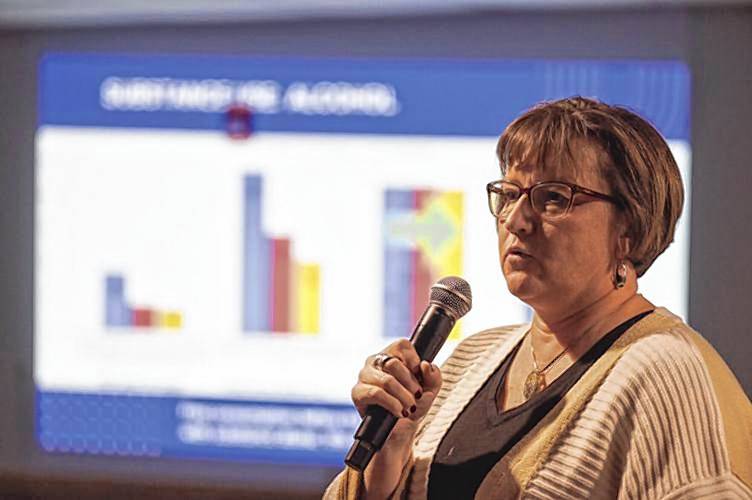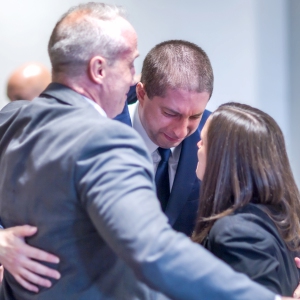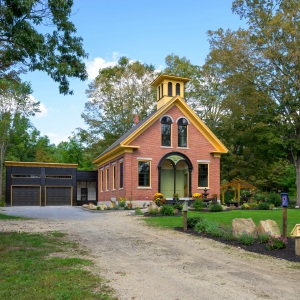Franklin City Council directs police to stop ticketing during winter parking ban

Coordinator of School Wellness Barbara Slayton gives a presentation on the 2023 Youth Risk Behavior Survey Results at a city council meeting at the Franklin Elks Lodge 1280 on Monday night. DANIEL SARCH—Laconia Daily Sun staff photo
| Published: 12-05-2024 9:51 AM |
FRANKLIN — Council addressed a number of items Monday night, including winter parking. The city council voted to pass a motion to direct the city manager to limit the police department to issuing parking tickets only if it’s actively snowing for 24 hours before a predicted snowstorm, and until the snow cleanup is done. The vote was 4-4 before Mayor Desiree McLaughlin broke the tie with a vote in favor. Councilor Ted Starkweather of Ward 1 was absent.
Residents have complained there is not adequate overnight parking, particularly for those living downtown in Ward 2. The issue is compounded when the winter ban takes effect.
“There is not enough parking anymore, overnight,” McLaughlin said. “We’re ticketing people but not giving them any way to solve the problem.”
Ordinance 284-12 of city code says all-night parking on any city street is prohibited from Nov. 1 through April 30. Parking on any public street is prohibited between 9 p.m. and 6:30 a.m. during snowstorms, snowplowing operations by the city or its agents, or during snow removal. It also says parking in any public parking area is prohibited between 11 p.m. and 6 a.m. Violating the ordinance can result in fines, usually $25, but can be up to $100 in certain instances, and towing at the vehicle owner’s expense.
McLaughlin said that due to the lack of parking, many residents, especially during the winter ban, park on the street or find other options that result in multiple tickets, some collecting them daily. She believes the city is punishing residents for a problem that is often out of their control. She suggested if the city did a comprehensive study of the housing market in the city, they could start to identify how much parking is needed. But right now, a short-term solution is a must, as paying tickets could prevent residents from paying for necessities.
“That’s serious. Someone might not pay their mortgage, or they can’t re-register their car eventually,” she said. “I’m not saying that I have plenty of parking. I’m saying this because it is not fair to charge someone for parking, and just because we didn’t do a study to find out how many people are there.”
Ward 2 Councilor Vincent Ribas identified various issues to be solved.
“I think we have three issues here the long term,” he said. “One is overall parking. The middle one is enough winter parking to get us through this season. And then the really short-term one is people getting ticketed nightly.”
Article continues after...
Yesterday's Most Read Articles
 Bill to allow ‘no fault’ evictions makes it to governor’s desk
Bill to allow ‘no fault’ evictions makes it to governor’s desk
 ‘He’s coming home’: Jury acquits former prison guard Matthew Millar in murder trial
‘He’s coming home’: Jury acquits former prison guard Matthew Millar in murder trial
 Look, up in the sky! It’s… an Airstream trailer?
Look, up in the sky! It’s… an Airstream trailer?
 Around Concord: Living in an 1856 schoolhouse is (mostly) delightful
Around Concord: Living in an 1856 schoolhouse is (mostly) delightful
 Slots and no bet limits: State budget shakes up New Hampshire’s casino landscape
Slots and no bet limits: State budget shakes up New Hampshire’s casino landscape
 ‘Deep flavor’ – New restaurant in downtown Concord offers creative spin on comfort food and cocktails
‘Deep flavor’ – New restaurant in downtown Concord offers creative spin on comfort food and cocktails
Councilor Timothy Johnston of Ward 1 made the motion, and Ribas seconded. Councilor Valerie Blake of Ward 3 questioned whether the motion was legal, as it attempts to overrule an ordinance. Ribas had a different take.
“To me, we’re not actually changing the ordinance. We’re just asking the police department to not enforce it while we seek a solution,” he said. “So it’s a one- to two-month solution.”
City Councilor Olivia Zink of Ward 2 said testing the legality of a motion has happened before.
“That has happened before, where we’ve take made a motion and then come back together and had to change that motion because legal told us that wasn’t allowed,” Zink said.
City Manager Judie Milner considered potential legal implications of the motion, addressing the city’s previous attempts to enforce all their rules to prevent selective enforcement, and thinks this motion goes against that objective.
“We’ve been constantly harping on the fact that we make rules and we don’t enforce them. So now we’re starting to enforce them, and now we’re the bad guys. We’re starting to enforce them,” she said. “So it’s a little bit of a catch-22 for us at this point.”
Some councilors, like Leigh Webb of Ward 3, believe the motion could create additional issues. Allowing parking except 24 hours in advance of a snowstorm could be problematic, particularly during an unpredictable snowstorm, leaving snowplows without the ability to clear roads. Some residents may not be tuned in to the weather enough to know when a storm is coming.
“It’s lovely to suggest that people would be cognizant enough to just move their car just before a snowstorm,” he said. “But that’s expecting a lot.”
There was a discussion around whether unused lots in the city could help alleviate the issue, which would require either further discussion with landlords or extra work for the city, like additional plowing. Some councilors suggested a more universal change, rather than one for a particular area.
Zink moved to look at and clarify ordinances 284-12 and 284-13, saying they have conflicting times for vehicles to be off the roads. Ordinance 284-13 does not explicitly state any times, but 284-12, Section A states no vehicle shall be parked on a public street continuously from midnight to sunrise. Section B states vehicles can’t park on public streets between the hours of 9 p.m. and 6:30 a.m., during the clearing of snow, and Section D states no motor vehicle can be standing or parked within any public parking area in the city except certain designated areas with signs stating parking is permitted between 11 p.m. and 8 a.m., so plows can operate between the hours of 11 p.m. to 6 a.m., during the months of January, February, March, November and December.
That motion was seconded by Councilor Susan Hallett-Cook of Ward 2, and passed unanimously.
Barbara Slayton, coordinator of school wellness, Stephanie Wolff, coordinator of Franklin Partners in Prevention, presented the 2023 Youth Risk Behavior Survey Results to the council. The survey provides insight into the experiences, behaviors and emotions of middle and high school students around topics that impact their lives, and inform an approach to creating a positive learning environment. The presentation had five areas of focus: basic needs, substance use behavior, sexual dating violence, bullying weapons, and sense of safety, and mental health and suicide risk.
Sixty-five percent of Franklin High School students took the survey, meaning 176 of 269 enrolled students. Franklin results were compared to the Winnipesaukee Public Health Region, which includes Winnisquam, Gilford, Inter-Lakes, Laconia, Governor Wentworth, and Prospect Mountain districts. The results were also compared to state and national results. The presentation can be found on the school website at sau18.org/page/youth-risk-behavior-survey.
The council also voted unanimously to adopt an amendment for their Hazard Mitigation Plan. The amendment changes the language to include the importance of reducing invasive species in the city’s water. This change would make the city eligible for funding to alleviate the imapcts of future hazards related to invasive species. Val Perkins, former president of the Webster Lake Association, was first to speak during public comment, thanking consultant Jane Hubbard for taking concerns of Webster Lake Association members and crafting an inclusive amendment. She also thanked Fire Chief Mike Foss for listening to resident concerns.
Paul Duncanson of Ward 1 and his wife Debbie Steadman expressed support for the amendment.
“The lake is our natural resource. It’s something that once it’s gone, it’s probably going to be gone. It’s very hard to get back from from a lot of these things,” he said.
The Meredith Selectboard also discussed implementing a Hazard Mitigation Plan during their meeting on Nov. 25. The board received the 163-page document the day of the meeting, so adoption of the plan was delayed until the board could make a more informed decision.
These articles are being shared by partners in the Granite State News Collaborative. For more information, visit collaborativenh.org.







 Celebrating independence: A list of local July 4 celebrations
Celebrating independence: A list of local July 4 celebrations Around Concord: Over The Moon Farmstead brings mead, beer, pizza and music to Pittsfield
Around Concord: Over The Moon Farmstead brings mead, beer, pizza and music to Pittsfield Around Concord: The Balshaws bring a rustic revival to the Canterbury Country Store
Around Concord: The Balshaws bring a rustic revival to the Canterbury Country Store
